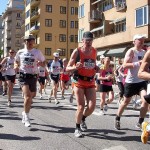Heart muscle damage evident in older marathon runners
Heart muscle damage is associated with excessive and long-term exercise, a new British study recently published in The Journal of Applied Physiology shows.
The researchers picked older runners who participated in at least 100 marathons and those who were Olympic distance runners. Twelve athletes were aged 50 and above and 17 others, 26 to 40 years old. All of them have been training most of their adult lives. A control group of 20 men 50 years old and above was also created for comparison.
A magnetic resonance imaging (MRI) scan of the hearts of the runners revealed that fibrosis or heart muscle damage and scarring was more evident in those who had the most intense and longest exercise. The younger and older non-athletes did not have the same findings.
The findings only show a link between heart muscle damage and too much exercise, but does not prove a definitive cause-and-effect relationship.
Doctors recommend moderate exercise as the way to go for most people in order to stave off health problems. But for those who are competing at an elite level such as ultramarathoners, or for those who have hidden heart disease, exercise can be fatal.
There have been numerous cases of runners, cyclists, or other athletes who suffered a heart attack during or immediately after a competition. Some of them have been proven to have significant heart muscle damage. Experts suggest that the heart can only be pushed up to a certain limit and going beyond the threshold will be detrimental rather than beneficial.
Unfortunately, scientists and physicians are unable to pin down the limit because of the variation between individuals. Heart attacks can be caused by arrhythmias and stiffening of heart walls because of heart muscle fibrosis.
